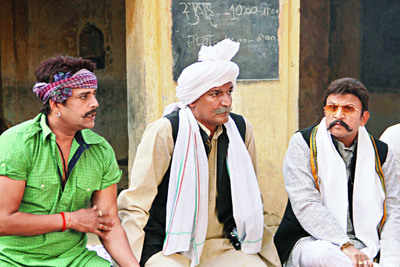- News
- entertainment
- hindi
- bollywood
- Filmmakers ask: If Censor board doesn’t mind our films, why should the khap?
Trending
This story is from July 18, 2015
Filmmakers ask: If Censor board doesn’t mind our films, why should the khap?
The recent ban on the release of Miss Tanakpur Haazir Ho in Muzaffarnagar, and protests against the song Mata Ka Email from Guddu Rangeela, have once again brought to light problems that khap-based movies face during their release.

The recent ban on the release of Miss Tanakpur Haazir Ho in Muzaffarnagar, and protests against the song 'Mata ka email' from Guddu Rangeela, have once again brought to light problems that khap-based movies face during their release. The khaps often take offence to movies that, to them, seem to question their authority or judgment and therefore, strongly oppose films that they think present khaps in a bad light.But filmmakers who have so far dealt with khap diktats feel that once the film has been cleared by the CBFC (Central Board of Film Certification), no autonomous body should have the right to disrupt its release.
Tale of troubles
Khap-based films have never had it easy when it came to their release, even if the ‘protests’ and ‘objections’ aren’t made directly by the khaps. Take, for example, Subhash Kapoor’s recent offering Guddu Rangeela – a film about two small-time orchestra singers based in Haryana, which touches upon the issue of khaps and honour killing. Kapoor had been quite clear, when he spoke to us earlier, that khaps had started ‘adjudicating’ on matters they had no jurisdiction in. Its song 'Kal raat mata ka mujhe email aaya hai' allegedly ‘upset the sentiments’ of a few religious organisations across the north and west of the country. As a result, the makers received several emails and threatening calls asking them to remove the song from the film, but they could never be traced back to any particular persons or organizations. The makers were threatened with dire consequences including disruption at theatres if they didn’t remove the song. “We received comments like, ‘Ye Hindustan hai, Pakistan nahi hai, go there,’ on social media platforms when the song was released with the promo of the film. But a few days before the release of the film, we started receiving threatening emails,” says Kapoor. In Ludhiana, there were demonstrations held demanding a ban to be put on the film and posters of the film were set on fire.
READ: Miss Tanakpur Haazir Ho Movie Review
Ajai Sinha’s Khap – A Story Of Honour Killing was based on honour killing and khap panchayats in Haryana. The film was taken off cinemas in the state after fights broke out outside cinema halls screening it. “The heads of various khap councils threatened to start an agitation if the movie was not banned,” says Sinha. Though sometimes filmmakers try to avoid controversy by presenting the issue in a light-hearted manner and adding humour to it, like they did in Miss Tanakpur Haazir Ho, it doesn’t seem to help. Shooting these films in areas where khaps dominate is as much a challenge as ensuring a hassle-free release. Sinha chose to shoot at Mahabaleshwar. He says, “Agar shooting wahaan hoti toh zaroor kuch na kuch hota. I wanted to complete the film without disruptions. The reaction of people during my research and recce in the area was a warning sign. When I spoke to them about honour killings, a villager told me, ‘Hum kya galat kar dete hain? Hum maar hi toh dete hain.’ I would not have made the film if I had to shoot it in Haryana, where the story takes place.”
Khap diktats
A member from the Ahlawat khap, which ‘banned’ the release of Miss Tanakpur, was reported as saying, “We are shown as a rapist society. Kapri’s film looks real merely because he has observed panchayats. The way he has destroyed our reputation is more disturbing than us calling for his beheading.” He added that their decision to ban Kapri’s film wasn’t pre-planned. In a report, he shared that he visited a family in village Bhainsi, Uttar Pradesh, where he overheard children whispering about this film where a man rapes a buffalo and ‘realised’ that “it polluted the minds of our kids.”
For latest Bollywood updates, follow us on Twitter >>>@TOIEntertain
For the latest in Bollywood news, like us on Facebook >>>TOIEntertain
In 2012, Haryana’s khap panchayats demanded that Aamir Khan’s popular TV show, Satyamev Jayate, be pulled off air. Khap leaders reportedly said that Aamir portrayed them in a ‘poor light’ and warned him against commenting on the Hindu tradition, particularly gotra marriages. “We are trying to safeguard social customs and traditions, which are the backbone of any society,” Randhir Singh, the president of Meham Chaubisi khap panchayat, who had also appeared on the show, was quoted as saying. He alleged that his views were edited by the producers when the episode went on air “to fuel anti-khap sentiments.” Most Haryana khaps condemned the show and shot off a missive to Aamir. While many films that seem to question khaps’ judgment or their power are banned in the villages, the films that run housefull in these areas come with titles like Hot Teri Deewangi, Kama Sutra, Kama Kala.
No one has a right to ban the film once Censor Board clears it, say filmmakers
The Censor Board is considered the final custodian of judging what is good or bad for viewers in India. Once it clears the film, no autonomous body should be allowed to disrupt the release of the film, say these filmmakers. “We are not in a country where we do not have freedom of speech. Each one of us is free to say what we feel. And in the case of films, once the Censor Board clears the film, why should there be another group raising an objection to the release of the film? Even if they have an objection to the content of the film, they can take up the issue with the Censor Board, I&B Ministry or any other governing body, but they just can’t issue a diktat and threaten cinema hall owners or coerce them not to release the film. Though I have never interacted with any of the members of these khap panchayats, I feel they misuse the power vested in them,” says Kapri.
Be it Miss Tanakpur, Guddu Rangeela or PK, it is common that objections are raised close to release of the film. Says Kapoor, “When there are protests from individuals and autonomous bodies just before the release of the film, you tend to question the credibility of these people and the intention behind it. It is very unfortunate that it happens all the time with Bollywood films. It is sad to see the way films are treated. Once the Censor Board clears the film, gives it certification, then, in my opinion, it is nobody’s business to disrupt the release of the film, especially without even seeing it or analysing the context.” Actor Arshad Warsi, who starred in Guddu Rangeela, also feels that, at times, these protests are “only for publicity.”
For more interesting Bollywood news and pictures, follow us on Pinterest>>> timesofindia
For latest Bollywood updates, follow us on G+ >>> The Times of India Entertainment
Listen to Guddu Rangeela songs on Gaana.com
WATCH: ‘Mata Ka Email’ upsets religious organisations - TOI
Tale of troubles
Khap-based films have never had it easy when it came to their release, even if the ‘protests’ and ‘objections’ aren’t made directly by the khaps. Take, for example, Subhash Kapoor’s recent offering Guddu Rangeela – a film about two small-time orchestra singers based in Haryana, which touches upon the issue of khaps and honour killing. Kapoor had been quite clear, when he spoke to us earlier, that khaps had started ‘adjudicating’ on matters they had no jurisdiction in. Its song 'Kal raat mata ka mujhe email aaya hai' allegedly ‘upset the sentiments’ of a few religious organisations across the north and west of the country. As a result, the makers received several emails and threatening calls asking them to remove the song from the film, but they could never be traced back to any particular persons or organizations. The makers were threatened with dire consequences including disruption at theatres if they didn’t remove the song. “We received comments like, ‘Ye Hindustan hai, Pakistan nahi hai, go there,’ on social media platforms when the song was released with the promo of the film. But a few days before the release of the film, we started receiving threatening emails,” says Kapoor. In Ludhiana, there were demonstrations held demanding a ban to be put on the film and posters of the film were set on fire.
READ: Miss Tanakpur Haazir Ho Movie Review
Then there was Miss Tanakpur Haazir Ho, the film that comments on the bizarre functioning of khaps. The film could not release in Muzaffarnagar, where the khap panchayat reportedly threatened cinema hall owners with ‘consequences’ if they released the movie. “The entertainment tax officer advised the theatre owners in Muzaffarnagar to take precautions and not screen the film. After warnings and threats by khap panchayats, they didn’t get proper security to release the film,” says the film’s director,
Vinod Kapri, who also sought police protection after receiving death threats from a khap panchayat in Uttar Pradesh. The khap panchayat reportedly even announced that they would give 51 buffaloes to anyone who beheaded Kapri. The film was described as an “insult to villages and khap panchayats.”
Ajai Sinha’s Khap – A Story Of Honour Killing was based on honour killing and khap panchayats in Haryana. The film was taken off cinemas in the state after fights broke out outside cinema halls screening it. “The heads of various khap councils threatened to start an agitation if the movie was not banned,” says Sinha. Though sometimes filmmakers try to avoid controversy by presenting the issue in a light-hearted manner and adding humour to it, like they did in Miss Tanakpur Haazir Ho, it doesn’t seem to help. Shooting these films in areas where khaps dominate is as much a challenge as ensuring a hassle-free release. Sinha chose to shoot at Mahabaleshwar. He says, “Agar shooting wahaan hoti toh zaroor kuch na kuch hota. I wanted to complete the film without disruptions. The reaction of people during my research and recce in the area was a warning sign. When I spoke to them about honour killings, a villager told me, ‘Hum kya galat kar dete hain? Hum maar hi toh dete hain.’ I would not have made the film if I had to shoot it in Haryana, where the story takes place.”
Khap diktats
A member from the Ahlawat khap, which ‘banned’ the release of Miss Tanakpur, was reported as saying, “We are shown as a rapist society. Kapri’s film looks real merely because he has observed panchayats. The way he has destroyed our reputation is more disturbing than us calling for his beheading.” He added that their decision to ban Kapri’s film wasn’t pre-planned. In a report, he shared that he visited a family in village Bhainsi, Uttar Pradesh, where he overheard children whispering about this film where a man rapes a buffalo and ‘realised’ that “it polluted the minds of our kids.”
For latest Bollywood updates, follow us on Twitter >>>@TOIEntertain
For the latest in Bollywood news, like us on Facebook >>>TOIEntertain
In 2012, Haryana’s khap panchayats demanded that Aamir Khan’s popular TV show, Satyamev Jayate, be pulled off air. Khap leaders reportedly said that Aamir portrayed them in a ‘poor light’ and warned him against commenting on the Hindu tradition, particularly gotra marriages. “We are trying to safeguard social customs and traditions, which are the backbone of any society,” Randhir Singh, the president of Meham Chaubisi khap panchayat, who had also appeared on the show, was quoted as saying. He alleged that his views were edited by the producers when the episode went on air “to fuel anti-khap sentiments.” Most Haryana khaps condemned the show and shot off a missive to Aamir. While many films that seem to question khaps’ judgment or their power are banned in the villages, the films that run housefull in these areas come with titles like Hot Teri Deewangi, Kama Sutra, Kama Kala.
No one has a right to ban the film once Censor Board clears it, say filmmakers
The Censor Board is considered the final custodian of judging what is good or bad for viewers in India. Once it clears the film, no autonomous body should be allowed to disrupt the release of the film, say these filmmakers. “We are not in a country where we do not have freedom of speech. Each one of us is free to say what we feel. And in the case of films, once the Censor Board clears the film, why should there be another group raising an objection to the release of the film? Even if they have an objection to the content of the film, they can take up the issue with the Censor Board, I&B Ministry or any other governing body, but they just can’t issue a diktat and threaten cinema hall owners or coerce them not to release the film. Though I have never interacted with any of the members of these khap panchayats, I feel they misuse the power vested in them,” says Kapri.
Be it Miss Tanakpur, Guddu Rangeela or PK, it is common that objections are raised close to release of the film. Says Kapoor, “When there are protests from individuals and autonomous bodies just before the release of the film, you tend to question the credibility of these people and the intention behind it. It is very unfortunate that it happens all the time with Bollywood films. It is sad to see the way films are treated. Once the Censor Board clears the film, gives it certification, then, in my opinion, it is nobody’s business to disrupt the release of the film, especially without even seeing it or analysing the context.” Actor Arshad Warsi, who starred in Guddu Rangeela, also feels that, at times, these protests are “only for publicity.”
For more interesting Bollywood news and pictures, follow us on Pinterest>>> timesofindia
For latest Bollywood updates, follow us on G+ >>> The Times of India Entertainment
Listen to Guddu Rangeela songs on Gaana.com
WATCH: ‘Mata Ka Email’ upsets religious organisations - TOI
End of Article
FOLLOW US ON SOCIAL MEDIA









